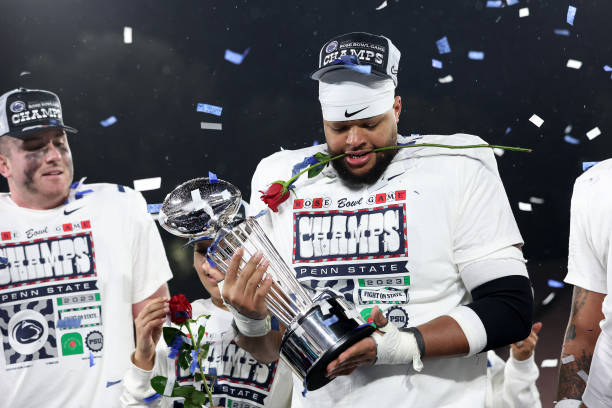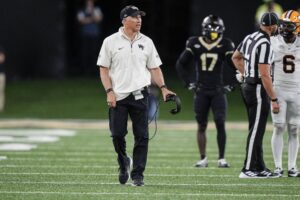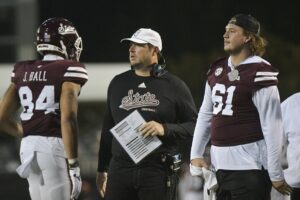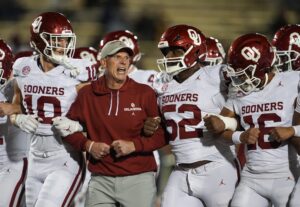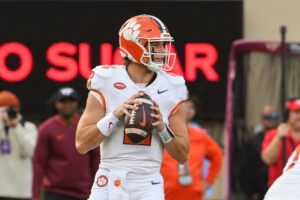It rained during the Rose Bowl for the first time since 1997. This could explain a slow start for both offenses, however, the rain didn’t start to fall until the second half. Further, if you looked at the crowd there was a lot of red in the stands, but Penn State fans were loud and proud on the broadcast. Despite being outnumbered. After a slow start for both teams, Penn State won its second Rose Bowl in the end 35-21. The Rose Bowl went into the half with Penn State and Utah tied 14-14. The Nittany Lions and the Utes both were very strong on defense and balanced when running the football in the first half. It wasn’t until Utah quarterback Cameron Rising went out of the contest in the third quarter that things started to become a little bit lopsided in favor of Penn State. So, how did Penn State win the Rose Bowl?
How Penn State Won the Rose Bowl
These were two physical and relatively evenly matched teams entering this contest. The first three possessions ended in punts. Penn State started with the football and gave it back to the Utes after a three-and-out. Rising and Utah couldn’t get anything going on their first attempt of the night either. After three plays Utah punted. The same thing again for the Nittany Lions and fans started to think this might be a defensive contest. This proved to be true on the next possession when Penn State cornerback Kalen King picked off Rising. The Nittany Lions capitalized off of an 11-play drive to strike first.
The second quarter had much more offense than the first. Three straight drives ended in a touchdown. First, Utah started the quarter off with a long 13-play touchdown drive. However, the Nittany Lions came right back with their own, retaking the lead. Then, Utah went 74 yards and tied it up.
Second Half Changes
The third quarter was all Penn State. Utah started with the ball and after 35 yards, Penn State got the stop. After a great punt by Jack Bouwmeester, the Nittany Lions were pinned at their own five-yard line. However, after Mitchell Tinsley caught an eight-yard pass from Sean Clifford, Nicholas Singleton rushed 87 yards for a touchdown. Penn State never looked back. Unfortunately, on Utah’s next drive, Rising rushed for a first down but was injured on the play. He wouldn’t return to the contest and finished the day eight-for-21 for 95 yards, one touchdown, and one interception. Rising also added nine rushes for 56 yards. Backup quarterback Bryson Barnes ended that drive with an interception as Rising walked to the locker room. The third quarter ended with a Penn State 21-14 lead.
The fourth quarter started with the Rose Bowl’s longest touchdown pass. An 88-yard throw from Clifford to Keandre Lamber-Smith. Putting Penn State up 28-14. The Nittany Lion defense finally got pressure on the quarterback and forced negative yards and a short field for its offense. Clifford only needed five plays and 47 yards to march his offense down the field again. This time Kaytron Allen barreled in for the one-yard score, putting Penn State up 35-14. Another negative yardage drive for the Utes gave the ball right back to Penn State. The Nittany Lion defense was finally able to get pressure on the quarterback in the fourth quarter. However, on the last drive of the game, Utah was able to score one more against the young backup secondary for Penn State. Finishing the game 35-21.
It was a curtain call for Clifford in the end. The senior was understandably emotional walking off the field after winning this one for his team. Clifford ended with 31 wins as the starter. Tied for first in school history. Freshman quarterback Drew Allar finished the game off with 2:30 left in the fourth quarter. Gatorade and roses were dumped on head coach James Franklin as the clock winded down to zero and the rain continued to fall.
How the Nittany Lions and the Utes Stacked Up Statistically
Penn State starting quarterback Clifford had to be almost perfect in this contest and he knew it. The senior ended his day 16-for-21 with 279 passing yards and two touchdowns. He was also named the Rose Bowl Offensive MVP. The biggest thing for Clifford is that he didn’t throw an interception, he made good decisions and used his legs when he needed to. Clifford utilized six different receivers in this one and tried to find his younger brother for his final pass, but the younger Clifford was covered.
We noted that the young Penn State running backs would be a big factor in the Rose Bowl and they were. Singleton got the first touchdown for the Nittany Lions in the first quarter, this gave him his 11th rushing touchdown on the year and the most by a freshman in Penn State history. Singelton ended the day with seven carries for 120 yards and two touchdowns. Fellow freshman phenom Allen had 11 carries for 37 yards and one touchdown on the day. Both were integral to Penn State’s win.
Manny Diaz’s defense was dominant in the second half. The unit finished the Rose Bowl with two interceptions, six sacks, and six tackles for loss. Curtis Jacobs led the Nittany Lion defense with sacks and tackles for loss. Ji’Ayir Brown finished the day with eight tackles, one-and-a-half sacks, and one-and-a-half tackles for loss and was named the Rose Bowl Defensive MVP for his efforts in the secondary.
Side-By-Side
The Nittany Lions racked up 448 yards of total offense to Utah’s 391. Additionally, Penn State won the turnover battle. The Nittany Lions kept the stat sheet clean, whereas the Utes threw two interceptions. Both teams had wide receivers that reached 100 receiving yards. Penn State’s Lambert-Smith had three receptions for 124 yards and one touchdown. In contrast, Utah’s Devaughn Vele had five receptions for 100 yards. The rushing attack for Utah was a slight question mark entering this one, but Micah Bernard and Ja’Quinden Jackson were both effective in the Rose Bowl. Jackson ended up the leading rusher for the Utes with 81 yards on 13 carries and one touchdown.


